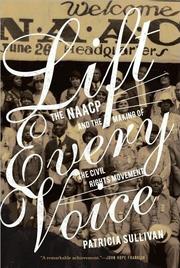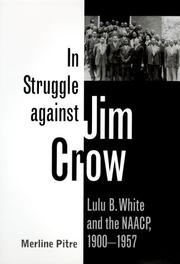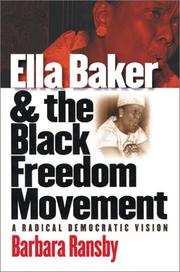Book
ISBN: 1610752465 9781610752466 9781557289087 1557289085 9781557289094 1557289093 Year: 2009 Publisher: Fayetteville University of Arkansas Press
Abstract | Keywords | Export | Availability | Bookmark
 Loading...
Loading...Choose an application
- Reference Manager
- EndNote
- RefWorks (Direct export to RefWorks)
Kevern Verney is associate head of the Department of English and History at Edge Hill University, England, and the author of The Debate on Black Civil Rights in America.
African Americans --- Civil rights movements --- Civil rights --- History --- Politics and government --- National Association for the Advancement of Colored People --- United States --- Race relations.

ISBN: 9781595584465 1595584463 Year: 2009 Publisher: New York ; London The New Press
Abstract | Keywords | Export | Availability | Bookmark
 Loading...
Loading...Choose an application
- Reference Manager
- EndNote
- RefWorks (Direct export to RefWorks)
African Americans --- Civil rights movements --- Afro-Amerikanen --- Mensenrechten --- National Association for the Advancement of Colored People (NAACP) --- Rassenrelaties --- Civil rights --- History --- mensenrechten --- geschiedenis --- Verenigde Staten --- National Association for the Advancement of Colored People --- History. --- United States --- Race relations. --- geschiedenis. --- Verenigde Staten.

ISBN: 0807841730 0807864110 9780807864111 9780807841730 0807817236 9780807817230 Year: 1987 Publisher: Chapel Hill London
Abstract | Keywords | Export | Availability | Bookmark
 Loading...
Loading...Choose an application
- Reference Manager
- EndNote
- RefWorks (Direct export to RefWorks)

ISBN: 1135930880 1280112832 0203997050 9780203997055 9780415949859 0415949858 9781135930776 1135930775 0415949858 9781135930882 9781280112836 9781135930837 9781135930875 9780415956659 1135930872 Year: 2005 Publisher: New York : Routledge,
Abstract | Keywords | Export | Availability | Bookmark
 Loading...
Loading...Choose an application
- Reference Manager
- EndNote
- RefWorks (Direct export to RefWorks)
Freedom's Sword is the first history to detail the remarkable, lasting achievements of the NAACP's first sixty years. From its pivotal role in overturning the Jim Crow laws in the South to its twenty-year court campaign that culminated with Brown v. the Board of Education, the NAACP has been at the forefront of the struggle against American racism. Gilbert Jonas, a fifty-year veteran of the organization, tracks America's political and social landscape period by period, as the NAACP grows to 400,000 members and is recognized by both blacks and whites as the leading force for social jus
African Americans --- Civil rights movements --- Racism --- Civil rights --- History --- Politics and government --- National Association for the Advancement of Colored People --- NAACP (Organization) --- N.A.A.C.P. (Organization) --- History. --- United States --- Race relations. --- Race question
Book
ISBN: 0813144469 0813143810 Year: 2014 Publisher: Lexington : The University Press of Kentucky,
Abstract | Keywords | Export | Availability | Bookmark
 Loading...
Loading...Choose an application
- Reference Manager
- EndNote
- RefWorks (Direct export to RefWorks)
Roy Wilkins (1901--1981) spent forty-six years of his life serving the National Association for the Advancement of Colored People (NAACP) and led the organization for more than twenty years. Under his leadership, the NAACP spearheaded efforts that contributed to landmark civil rights legislation, including the 1964 Civil Rights Act and Voting Rights Act.In Roy Wilkins: The Quiet Revolutionary and the NAACP, Yvonne Ryan offers the first biography of this influential activist, as well as an analysis of his significant contributions to civil rights in America. While activists in Alabama
Book
ISBN: 0199913463 0190254289 1283428199 9786613428196 0199930554 Year: 2011 Publisher: Oxford ; New York : Oxford University Press,
Abstract | Keywords | Export | Availability | Bookmark
 Loading...
Loading...Choose an application
- Reference Manager
- EndNote
- RefWorks (Direct export to RefWorks)
In August, 1933, dozens of people gathered amid seven large, canvas tents in a field near Amenia, in upstate New York. Joel Spingarn, president of the board of the NAACP, had called a conference to revitalize the flagging civil rights organization. In Amenia, such old lions as the 65 year-old W.E.B. DuBois would mingle with ""the coming leaders of Negro thought."" It was a fascinating encounter that would transform the civil rights movement. With elegant writing and piercing insight, historian Eben Miller narrates how this little-known conference brought together a remarkable young group of Af
Civil rights movements --- African Americans --- History --- Civil rights --- Economic conditions --- Redding, Louis L. --- Harris, Abram Lincoln, --- Jackson, Juanita C. --- Weston, M. Moran, --- Bunche, Ralph J. --- National Association for the Advancement of Colored People --- Amenia Conference

ISBN: 0585387842 9780585387840 0890968691 9780890968697 1603441999 9781603441995 Year: 1999 Volume: no. 81 Publisher: College Station : Texas A&M University Press,
Abstract | Keywords | Export | Availability | Bookmark
 Loading...
Loading...Choose an application
- Reference Manager
- EndNote
- RefWorks (Direct export to RefWorks)
African American women civil rights workers --- Civil rights workers --- African Americans --- United States Local History --- Regions & Countries - Americas --- History & Archaeology --- Afro-Americans --- Black Americans --- Colored people (United States) --- Negroes --- Africans --- Ethnology --- Blacks --- Civil rights activists --- Race relations reformers --- Social reformers --- Afro-American women civil rights workers --- Women civil rights workers, African American --- Women civil rights workers --- Civil rights --- History --- White, Lulu B. --- National Association for the Advancement of Colored People --- National Association for the Advancement of Colored People. --- NAACP (Organization) --- N.A.A.C.P. (Organization) --- Houston (Tex.) --- Houston City (Tex.) --- Race relations. --- Black people
Book
ISBN: 1557287597 1610755642 9781610755641 9781557287595 Year: 2015 Publisher: Fayetteville
Abstract | Keywords | Export | Availability | Bookmark
 Loading...
Loading...Choose an application
- Reference Manager
- EndNote
- RefWorks (Direct export to RefWorks)
When Aaron Henry returned home to Mississippi from World War II service in 1946, he was part of wave of black servicemen who challenged the racial status quo. He became a pharmacist through the GI Bill, and as a prominent citizen, he organized a hometown chapter of the NAACP and relatively quickly became leader of the state chapter. From that launching pad he joined and helped lead an ensemble of activists who fundamentally challenged the system of segregation and the almost total exclusion of African Americans from the political structure. These efforts were most clearly evident in his leadership of the integrated Mississippi Freedom Democratic Party delegation, which, after an unsuccessful effort to unseat the lily-white Democratic delegation at the Democratic National Convention in 1964, won recognition from the national party in 1968. The man who the New York Times described as being "at the forefront of every significant boycott, sit-in, protest march, rally, voter registration drive and court case" eventually became a rare example of a social-movement leader who successfully moved into political office. Aaron Henry of Mississippi covers the life of this remarkable leader, from his humble beginnings in a sharecropping family to his election to the Mississippi house of representatives in 1979, all the while maintaining the social-change ideology that prompted him to improve his native state, and thereby the nation.
African Americans --- Civil rights movements --- Civil rights workers --- African American civil rights workers --- Civil rights --- History --- Henry, Aaron, --- National Association for the Advancement of Colored People --- 1900 - 1999 --- Mississippi. --- Mississippi --- Afro-American civil rights workers --- Civil rights workers, African American --- Civil rights activists --- Race relations reformers --- Social reformers --- Afro-Americans --- Black Americans --- Colored people (United States) --- Negroes --- Africans --- Ethnology --- Black people --- Association for the Advancement of Colored People --- NAACP --- Estado de Misisipi --- État du Mississippi --- Medinat Misisipi --- Mikikipi --- Misisipi --- Misisipʻi-ju --- Mísísípii Hahoodzo --- Misisipio --- Missisipi --- Mississippi osariik --- Mississippy --- Politeia tou Misisipi --- Shtat Misisipi --- State --- State of Mississippi --- US-MS

ISBN: 9780807862703 0807862703 0807827789 0807856169 9780807862704 9780807827789 9780807856161 9798890870124 Year: 2003 Publisher: Chapel Hill London
Abstract | Keywords | Export | Availability | Bookmark
 Loading...
Loading...Choose an application
- Reference Manager
- EndNote
- RefWorks (Direct export to RefWorks)
One of the most important African American leaders of the 20th century and perhaps the most influential woman in the civil rights movement, Ella Baker (1903-1986) was an activist whose remarkable career spanned 50 years and touched thousands of lives.
African American women civil rights workers --- Civil rights workers --- Civil rights movements --- African Americans --- History --- Civil rights --- Baker, Ella, --- National Association for the Advancement of Colored People --- Mississippi Freedom Democratic Party --- Southern States --- United States --- Race relations. --- MFDP (Mississippi Freedom Democratic Party) --- NAACP (Organization) --- N.A.A.C.P. (Organization) --- Race question --- Mississippi Freedom Project

ISBN: 128047016X 1423740432 0195344324 1602566518 9780195116335 019511633X 9781423740438 9786610470167 6610470162 019511633X 0197724663 9781602566514 Year: 1999 Publisher: New York Oxford University Press
Abstract | Keywords | Export | Availability | Bookmark
 Loading...
Loading...Choose an application
- Reference Manager
- EndNote
- RefWorks (Direct export to RefWorks)
This collection of writings offers a glimpse into the minds of three N.A.A.C.P. leaders who occupied the centre of black thought and action during some of the most troublesome and pivotal times of the civil rights movement.
African Americans --- Civil rights --- History --- Johnson, James Weldon, --- White, Walter, --- Wilkins, Roy, --- White, Walter Francis, --- White, Walter F., --- Johnson, J. W. --- Johnson, Jas. W. --- National Association for the Advancement of Colored People --- NAACP (Organization) --- N.A.A.C.P. (Organization) --- United States --- Race relations --- Johnson, James Weldon.

 Search
Search Feedback
Feedback About UniCat
About UniCat  Help
Help News
News